Biden administration faces ‘critical moment’ on migration
Under fire for Haitian migrant expulsions, advocates say the US should expect more arrivals as conditions in Haiti worsen.
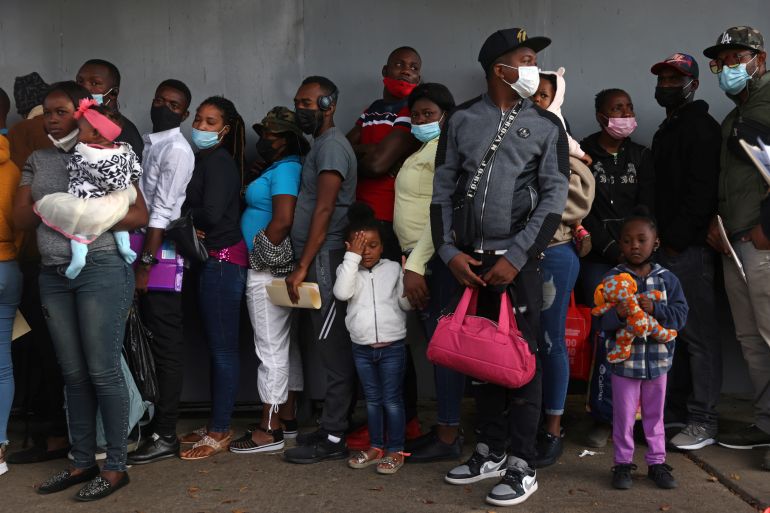
Washington, DC – Expulsion to Haiti, retreat to Mexico or detention in the United States – these have been the options facing more than 14,000 mostly Haitian migrants who camped under a bridge in the US state of Texas last week, hoping to gain asylum.
But while thousands have been deported from the US, and those who remain face a similar fate, rights groups say Haitian asylum seekers, many of them families with children, will keep coming in search of protection.
Keep reading
list of 3 itemsTexas border camp emptied as US continues to deport Haitians
Haiti elections postponed indefinitely amid political crisis
“This is not a deterrence measure or even a Band-Aid solution,” said Guerline Jozef, co-founder and executive director of Haitian Bridge Alliance, an organisation that assists Haitian migrants, of the US expulsion policy.
Jozef said Haitians are facing a worsening political and economic crisis in their home country and those who have been deported are likely going to try to make their way back to the US-Mexico border, or to another country along the way in the coming weeks.
“They are destroying people’s lives, knowing that the same people will come back if they survive the journey,” Jozef told Al Jazeera.
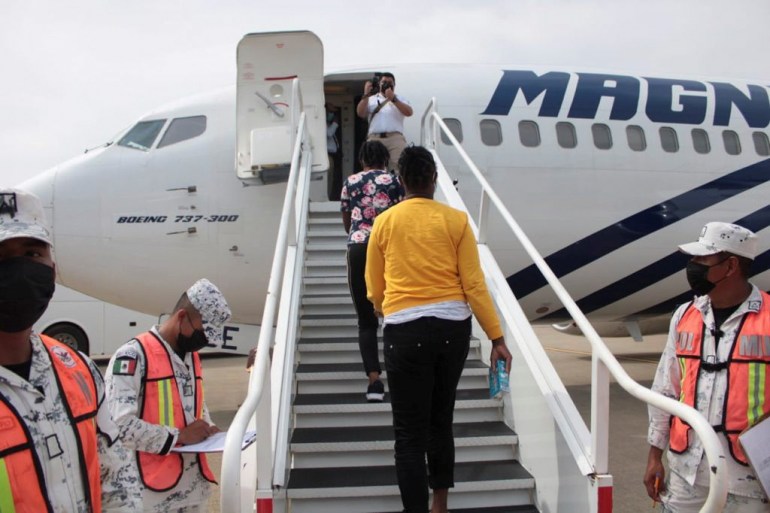
‘Title 42’ expulsions
The US so far has expelled more than 6,000 migrants to Haiti, US Customs and Border Protection (CBP) told CBS News, while an unknown number of others remain in CBP custody, though most face expulsion.
CBP did not respond to a request for comment from Al Jazeera in time for publication.
The Reuters news agency also reported this week that another 8,000 people, fearing deportation, have gone back to Mexico, where their fates are unclear.
The asylum seekers waded through the Rio Grande River from Mexico into Texas, where they were met by US border patrol agents on horseback, some of whom used what appeared to be reins to push them back to Mexico.
Immigration advocates, as well as progressive Democratic leaders, have blasted the administration of US President Joe Biden over the treatment of the Haitian migrants, saying denying them the right to asylum amounts to a violation of international law.
The Biden administration has been relying on a Trump-era policy called “Title 42” to immediately return most migrants who arrive at the country’s borders, citing the coronavirus pandemic as justification.
Rights groups say they expect more from Biden, who campaigned on promises to put in place more welcoming and humane immigration policies than his predecessor Donald Trump. The US special envoy to Haiti resigned in protest over the expulsions.
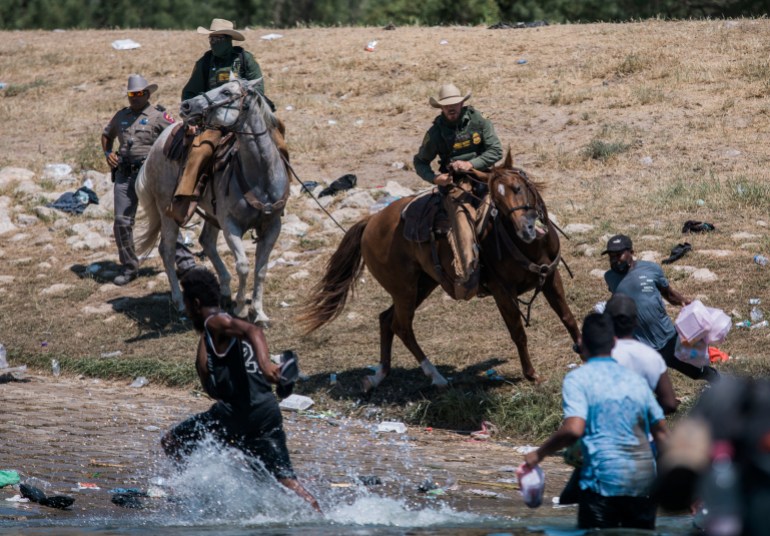
“There are Haitian migrants still heading up through Mexico to the border right now, this is not going to stop,” said Breanne Palmer, interim policy and advocacy director at UndocuBlack Network, an organisation that advocates for undocumented Black migrants in the US.
“This is a critical moment for the Department of Homeland Security [DHS] and President Biden to decide what kind of immigration legacy he is going to leave,” Palmer told Al Jazeera.
On Thursday, a US appeals court ruled that the Biden administration – which has exempted children travelling alone from Title 42 expulsions – can continue expelling migrant families under the policy while a lawsuit challenging the measure is in progress.
“We’re disappointed that Title 42 remains in place while the appeal goes forward but we will continue fighting in court and pushing the Biden administration to repeal the policy,” said Lee Gelernt, a lawyer for the American Civil Liberties Union, one of the groups that brought the case.
“The administration has said it wants to act humanely, this is the time for it to step up,” Gelernt told Al Jazeera.
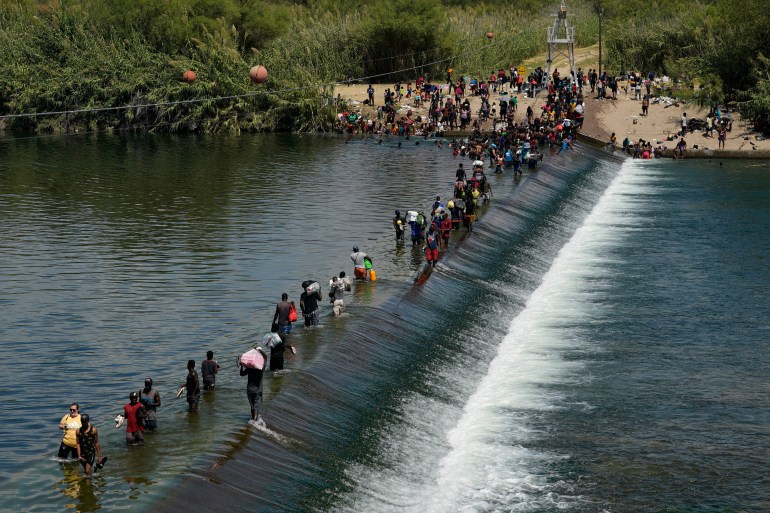
Simultaneous crises
The deportations to Haiti come at a time when the country is suffering from multiple crises. In July, President Jovenel Moise was assassinated and a month later, a powerful 7.2 magnitude earthquake struck the south.
During his address to the United Nations General Assembly last week, Haitian Prime Minister Ariel Henry said inequality, poverty and conflict will remain the main drivers of migration.
“Human beings, fathers and mothers who have children, are always going to flee poverty and conflict,” he said. “Migration will continue as long as the planet has both wealthy areas, whilst most of the world’s population lives in poverty, even extreme poverty, without any prospects of a better life.”
But many of the Haitian asylum seekers who arrived at the US-Mexico border last month had left Haiti years ago after a massive earthquake devastated much of the island in 2010. Many moved to Chile or Brazil in search of jobs, while others have been living in Mexico for years waiting for an opportunity to claim asylum in the US.
Fifty-seven deportation flights have left the US since September 19 bound for the Haitian capital, Port-au-Prince, and the northern coastal city of Cap Haitien, where Nicole Phillips, legal director for the Haitian Bridge Alliance, said the airport did not have buses to shuttle deportees to town.
“We’re calling for an immediate stop to the deportations and expulsions because Haiti cannot receive them,” Phillips told Al Jazeera. “Logistically, Haiti does not have the infrastructure to receive this quantity of en masse deportations.”
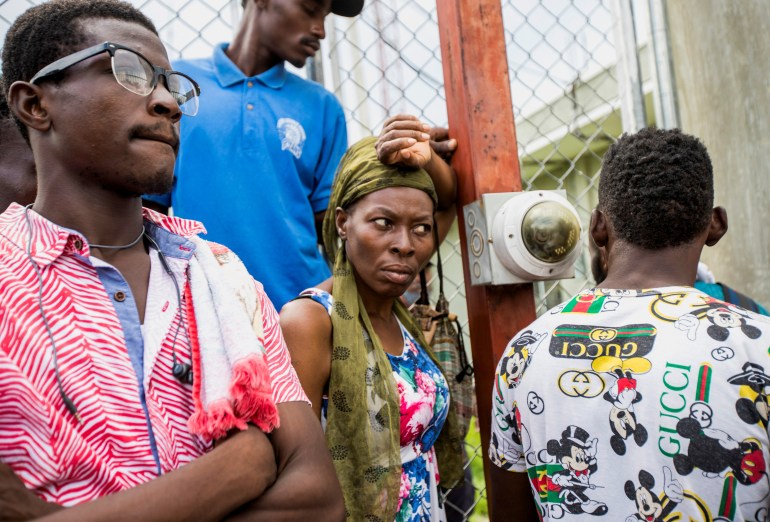
On Friday, Bahamian and Cuban authorities said they stopped hundreds of Haitians who were on boats trying to reach the US by sea. Officials from both countries said they would send them back to Haiti.
Meanwhile, several hundred Haitians who returned to Mexico have been staying in shelters in the northern city of Ciudad Acuna, Phillips said. She added that many others were flown or bussed to the southern city of Tapachula on the border with Guatemala, where immigration groups say they risk detention if they leave.
Earlier this week, Mexico turned an Olympic stadium in Tapachula into an asylum processing centre. But the country’s Commission for Refugee Assistance (COMAR) has been overwhelmed with asylum applications, and the process is fraught with delays.
On Wednesday, Mexico expelled 70 Haitians, including 13 children, on a flight to Port-au-Prince as part of what it said was “assisted voluntary return”. More flights are expected in the coming weeks.
“We do not want Mexico to become a migrant camp, we want the underlying problem to be addressed, that people are not forced to emigrate,” Mexico’s President Andres Manuel Lopez Obrador said last week.
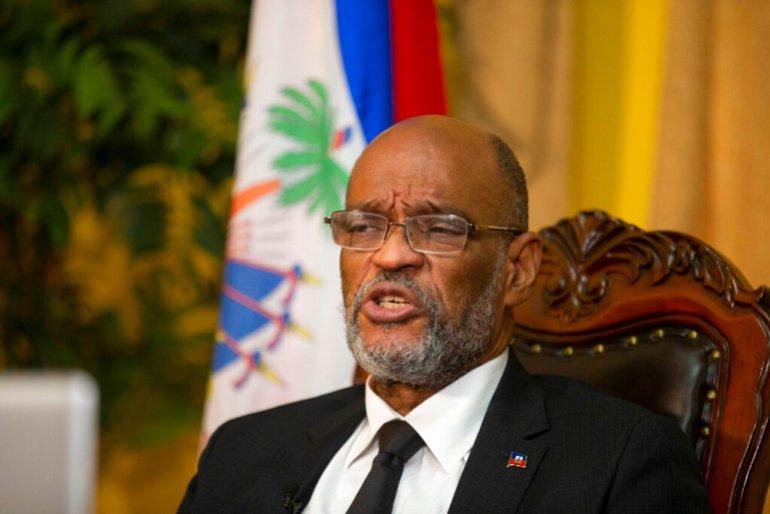
‘Carte blanche’
Back in the US, Biden has stated that the border patrol agents who charged at the migrants would “pay” for what they did, while DHS Secretary Alejandro Mayorkas said a swift investigation would be concluded soon.
Pro-immigration groups welcomed the condemnations, but said the images were a stark example of the anti-Black and anti-immigrant sentiment that remains prevalent among border enforcement agencies.
“No matter where Black people go there are sentiments that are disparaging of our humanity and our ability and right to seek asylum and to seek refuge,” Palmer said.
“Many Black migrants are dealing with a multifaceted experience that often involves violence, harm discrimination and closed doors,” she told Al Jazeera. “We are in a unique position in that we are very visible but we are also made invisible.”
Meanwhile, Jozef said her organisation has not been able to access the Haitian migrants still in CBP custody, nor has it been able to provide legal or language assistance to them.
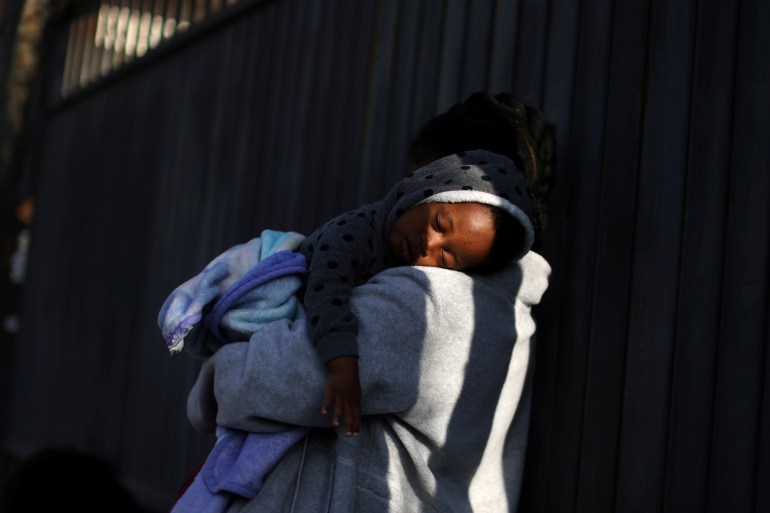
Jozef stressed that as conditions in Haiti continue to deteriorate, more people will flee in search of protection, safety and jobs, most to neighbouring nations in Latin America – and the way the US treats Haitian migrants sets a critical example.
“As the world is watching how the United States treats little Black girls and little Black boys and their parents who are in search of safety and protection – not only are they destroying lives by deporting them and sending them to Haiti – they are also facilitating and giving carte blanche to all the other countries where Haitians are asking for support,” Jozef said.
“They are literally creating a system where Haitians cannot be allowed in any space at all.”